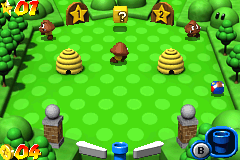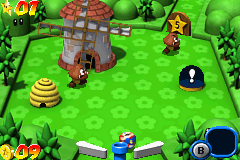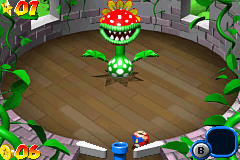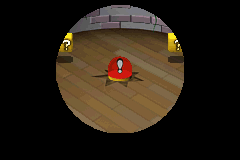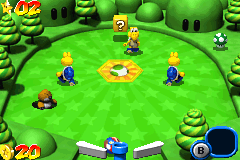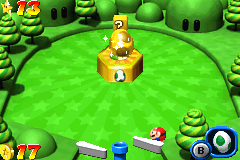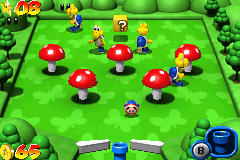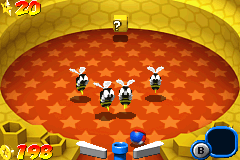Grassy Greens Stage
| Level | |||
|---|---|---|---|
| Grassy Greens Stage | |||
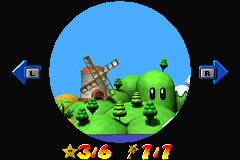
| |||
| Game | Mario Pinball Land | ||
| Music track | Grassy | ||
| |||
| << Directory of levels >> | |||
- “This verdant stage is full of lush greenery and vicious insects.”
- —Mario Pinball Land instruction manual, pg. 20
The Grassy Greens Stage[1] is a level in Mario Pinball Land. The stage is composed of grassy fields, green hills, and trees and features Goombas, Koopas, and beehives with Bumblers. The boss of the stage is Petey Piranha.
Areas[edit]
NOTE: Unless otherwise marked, all names are unofficial.
Starting area[edit]
The starting area in the Grassy Greens Stage features two empty beehives, along with three Goombas. In the top center of the area is a ? Block (which contains a Pipe) that is replaced by a Sky Cannon once Petey Piranha is defeated. Defeating all Goombas in the area yields the player a Star. After Petey Piranha is defeated, one Bumbler appears in each beehive in the area.
Windmill area[edit]
The windmill area is accessible via the 1-★ door in the starting area. This area features two Goombas, the windmill, a Blue Switch, and a shaking beehive. Hitting the switch stops the windmill's blades, and hitting the beehive releases three Bumblers in the area. Defeating all Bumblers and Goombas yields the player a Star.
Inside the windmill[edit]
Inside the windmill, Petey Piranha is fought. He must be hit three times by Mario, and he leaves behind a Star Key once defeated. After the boss is defeated, two ? Blocks appear in the area, and after Mario brings the Star Key to the Fiery Stage, a Red Switch appears at the center of the area, where Petey Piranha stood.
Blue Koopa area[edit]
The blue Koopa area is accessible via the 2-★ door in the starting area. This area features three blue Koopas, a Monty Mole, and a ? Block with a Mega Mushroom. Hitting the Monty Mole in all four positions rewards the player with a 1-UP Mushroom, and defeating all Koopas yields the player a Star. The Egg Mark is found in this area.
Mushroom area[edit]
The mushroom area is accessible via the 5-★ door in the windmill area. This area features five mushrooms that knock Mario back if hit, a ? Block with a Yoshi Egg, and four blue Koopas. Defeating all Koopas yields the player a Star.
Inside a beehive[edit]
By using a Mini Mushroom, Mario is able to enter any of the three beehives in the stage. The inside of a beehive is a circular room containing four Bumblers and a ? Block with a Yoshi Egg. Defeating all Bumblers yields the player a Star. Regardless of which beehive was entered, only one Star is obtainable this way.
Names in other languages[edit]
| Language | Name | Meaning | Notes |
|---|---|---|---|
| Japanese | 草原ステージ[?] Sōgen Sutēji |
Grassy Field Stage | |
| French (NOE) | Tableau de la Grasses Plaines[2] | Table of the Grasses Plains | |
| German | Grünflur[3] | Green Hall | |
| Italian | Livello verdeggiante[4] | Verdant level | |
| Spanish (NOE) | Las Praderas Primorosas[5] | The Primrose Prairies |
References[edit]
- ^ 2004. Mario Pinball Land instruction booklet. Nintendo of America (English). Page 20.
- ^ 2004. Super Mario Ball European instruction booklet. Nintendo of Europe (French). Page 58.
- ^ 2004. Super Mario Ball European instruction booklet. Nintendo of Europe (German). Page 98.
- ^ 2004. Super Mario Ball European instruction booklet. Nintendo of Europe (Italian). Page 118.
- ^ 2004. Super Mario Ball European instruction booklet. Nintendo of Europe (Spanish). Page 98.
